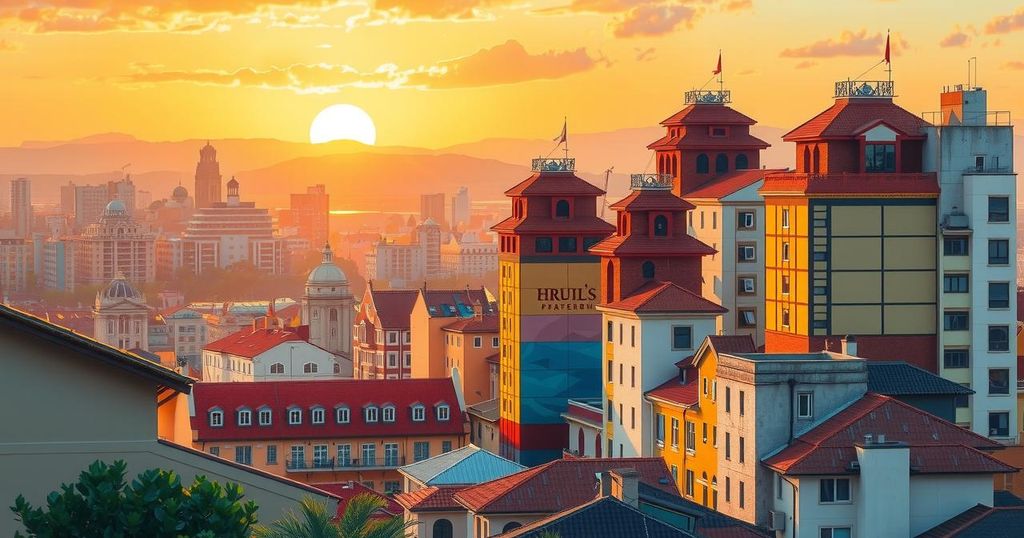Assessing Syria’s Transitional Phase: Opportunities and Challenges Ahead

Ghassan Ibrahim expresses cautious optimism regarding Syria’s transition away from the Assad regime, acknowledging significant challenges such as poverty, institutional collapse, and sanctions. Key diplomatic outreach by President Al-Sharaa aims to reintegrate Syria into the region, while the absence of widespread sectarian violence post-Assad is a notable achievement. The evolving dynamics with Turkey, Israel, and Iran highlight the precarious nature of Syria’s stabilization efforts.
The current state of Syria, four months into the transition away from the Assad dynasty, is characterized by cautious optimism, according to analyst Ghassan Ibrahim. In a recent episode of “Frankly Speaking,” he discussed the challenges faced by President Ahmad Al-Sharaa’s newly formed government, facing issues like institutional collapse, poverty, and a repressive sanctions regime.
Ibrahim noted that while there is significant hope for Syria’s future, securing the necessary resources for governance remains a critical question. With over 90 percent of Syrians living below the poverty line and a lack of skilled professionals due to mass migration, the government faces daunting economic realities. The country’s wealth of natural resources is largely untapped due to ongoing instability.
Despite the challenges, Ibrahim highlighted the absence of widespread sectarian violence as a positive outcome following Assad’s departure. While concerns remain, such as localized violence, the overall situation shows potential for stabilization and recovery. He remarked, “If we look at the full picture, it’s something promising, but requires a lot of work.”
Al-Sharaa’s recent diplomatic visits to Saudi Arabia and the UAE have strategic significance, aiming to establish Syria as part of a modern, stable alliance. Ibrahim emphasized the importance of these relationships for Syria’s reintegration into the region, stating, “Syria needs now friends and brothers to help them.” His observations suggested that these visits reassured neighboring countries of Syria’s commitment to regional stability.
The relationship with Turkiye presents opportunities and complications, particularly regarding Kurdish tensions and Israeli security implications. Ibrahim noted that while Turkish involvement could aid stabilization, it risks heightening regional rivalries. He remarked, “We’ve noticed the involvement of Turkiye has caused two troubles somehow: with the Kurdish internally and with Israel.”
Ibrahim also discussed the ongoing tensions with Israel, acknowledging the uptick in Israeli airstrikes in southern Syria while noting the new government’s efforts to manage these risks. He stated that maintaining a steady relationship with Israel is recognized as beneficial for both sides, underscoring the evolving stance of Damascus towards normalization.
Iran’s role in Syria remains a concern, with Ibrahim warning that Tehran’s support for various militias threatens stability. He emphasized the need for Syria to distance itself from Iranian influence to facilitate potential normalization. Without the lifting of U.S. and European sanctions, he cautioned that Syria’s development would continue to be stymied.
The sanctions, according to Ibrahim, have extended beyond their initial purpose, now notably impacting ordinary citizens and undermining the new government’s ability to govern effectively. Without improvements in living conditions, there is a risk of public unrest.
The emergence of violence linked to regime loyalists showcases the fragile security situation. Ibrahim noted President Al-Sharaa’s clemency policy as a double-edged sword that, while intended to foster unity, may have inadvertently allowed hostilities to resurface. He believes that addressing criticisms regarding cabinet representation is essential for the new government’s legitimacy.
Ibrahim also commented on the potential for a defense pact involving Turkiye and its implications for Syrian autonomy. He noted efforts to mediate a peaceful agreement between Turkiye and Kurdish forces, which could shift the balance of power.
While seeking to engage with the West, Syria is careful to maintain ties with Russia, which remains a pragmatic ally possessing the capability to mediate in regional conflicts. Ibrahim remarked on Russia’s unique standing in potentially facilitating an agreement with Israel.
In conclusion, Ibrahim noted that Syria is moving toward a future characterized by stability and development, enabling normalization with a variety of states, including Israel. He expressed optimism for a unified vision among Syrians towards rebuilding the country as a center for trade and positive relationships globally.
In summary, the analysis of Syria’s current transitional period underscores a blend of hope and significant challenges. The new government under President Al-Sharaa seeks to forge strategic alliances to foster stability and regional integration. However, the profound impact of economic sanctions, the need for reconstruction, and the complexities of foreign relations continue to constrain the nation’s path forward. Ibrahim’s insights reflect a cautious yet strategic outlook for Syria, emphasizing the importance of cooperation and reform to pave the way toward recovery and normalization.
Original Source: www.arabnews.pk







